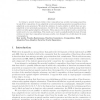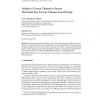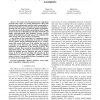73 search results - page 4 / 15 » Security of erasable memories against adaptive adversaries |
110
click to vote
CRYPTO
2009
Springer
15 years 8 months ago
2009
Springer
We consider two-party quantum protocols starting with a transmission of some random BB84 qubits followed by classical messages. We show a general “compiler” improving the secur...
127
click to vote
ICALP
2007
Springer
15 years 3 months ago
2007
Springer
Adaptive security, while more realistic as an adversarial model, is typically much harder to achieve compared to static security in cryptographic protocol design. Universal composi...
119
click to vote
EUROCRYPT
2004
Springer
15 years 7 months ago
2004
Springer
In trying to provide formal evidence that composition has security increasing properties, we ask if the composition of non-adaptively secure permutation generators necessarily pro...
INFORMATICALT
2006
15 years 1 months ago
2006
This paper proposes a threshold key escrow scheme from pairing. It tolerates the passive adversary to access any internal data of corrupted key escrow agents and the active adversa...
120
click to vote
FOCS
2010
IEEE
14 years 11 months ago
2010
IEEE
We construct the first general secure computation protocols that require no trusted infrastructure other than authenticated communication, and that satisfy a meaningful notion of s...



